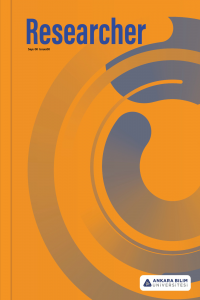Örgütsel Demokrasi: Örgüte neler kazandırabilir?
Örgüt Çalışan Örgütsel demokrasi Örgütsel demokrasinin yararları
Organizational Democracy: What can it add to the Organization?
Organization Employees Organizational democracy The benefits of organizational democracy.,
___
- Bowles, S. & Gintis, H. (1993). A Political and economic case for the democratic enterprise. Economics and Philosophy, 9, 75–100.
- Butcher, D., & Clarke, M. (2002). The cornerstone for organizational democracy. Organizational Dynamic, 31(1), 35-41.
- Coşan, P. E., & Gülova, A. A. (2014). Örgütsel demokrasi. Yönetim ve Ekonomi, 21(2), 231-248.
- Collins, D. (1997). The ethical superiority and inevitability of participatory management as an organizational system. Organizational Science, 8, 489-507.
- Cotton, J. L., Vollrath, D. A., Froggatt, K. L., Lengnick-Hall, M. L., & Jennings, K. R. (1988). Employee participation: Diverse forms and different outcomes. Academy of Management Review, 13, 8-22.
- Crane, A., & Matten, D. (2005). What is stakeholder democracy? Perspectives and Issues, Business Ethics: A Europan Review, 14 (1), 6-13.
- Desai, N. (2009). Management by trust in a democratic enterprise: a law firm shapes organizational behavior to create competitive advantage. Global Business and Organizational Excellence, September/October, 7-21.
- Drucker, P.F. (1999). 21. Yüzyıl İçin Yönetim Tartışmaları. (G. Gorbon ve İ. Bahçıvangil, Çev.). 1. Basım. İstanbul: Epsilon Yayınevi.
- Foley, J. & Polanyi M. (2006). Workplace democracy: Why bother? Economic and Industrial Democracy, 27, 173 -19I .
- Forcadell, F. J. (2005). Democracy, cooperation and business success: The case of Mondragón Corporación Cooperativa. Journal of Business Ethics, 56(3),255-274.
- Geçkil, T. (2013). The Relationship between Organizational Democracy and Organizational Citizenship Behaviors: A Research at University Hospitals in TRB1 Region. Unpublished Doctoral Dissertation. Social Science Institute. Cumhuriyet University, Sivas.
- Geçkil, T. & Tikici, M. (2015). A study on developing the organizational democracy scale. Amme İdaresi Dergisi, 48(4), 41-78.
- Geçkil T. & Tikici M. (2016a). Hospital employees' organizational democracy perceptions and its effects on organizational citizenship behaviors. Asian Pacific Journal of Health Sciences, 3(2): 123-136
- Geçkil T., İleri, Y.Y., Kaya, Ş. D. & Karadağ, Ş. (2016b). The relationship between organizational democracy perceptions and organizational psychological capital levels of physicians and nurses. International Journal of Recent Advances in Organizational Behaviour and Decision Sciences (IJRAOB), 2 (3), 818-835.
- Gilliland, S. W.& Chan, D. (2009). Örgütlerde Adalet: Teori, Yöntemler ve Uygulamalar,Endüstri, İş ve Örgüt Psikolojisi El Kitabı. 2. Cilt: Örgüt Psikolojisi, (D. A. Altan, Çev.), (Eds. Neil Anderson, Deniz S. Öneş, Handan Kepir Sinangil ve Chockalingam Viswesvaran), (Türkçe Ed. Handan Kepir Sinangil), İstanbul: Literatür Yay. Dağ. Paz. San. Tic. Ltd. şti., s.167-193.
- Hallström, Kristina Tamm (2010). The use of democratic values in the ISO 26000 processon social responsibility”, (Article in Book: Eds: Göran Sundström; LindaSoneryd; Staffan Furusten) Organizing Democracy: The Construction of Agency in Practice, Cheltenham, UK; Northampton, MA: Edward Elgar, s. 48-64.
- Hamel, G. & Breen, B. (2007). Yönetimin Geleceği, (F. Gülfidan Çev.). İstanbul: MESS Yayınları, Yayın No: 536.
- Handy, C. (1998). Ruhun Arayışı. Kapitalizmin Ötesi: Modern Dünyada Amaç Arayışı. (N. Elhüseyni, Çev.). İstanbul: Boyner Holding Yayınları.
- Harrison, J.S., & Freeman, R.E. (2004). Is organizational democracy worth the effort? Academy of Management Executive,18 (3), 49-53.
- Heywood, A.(2007). Siyaset, (B. B. Özipek, Çev., B. Kalkan, Çev. Ed.). Ankara: Adres Yayınları.
- Hoffman, M.F. (2002). Do all things with counsel, benedictine women and organizational democracy. Communication Studies, 53(3), 203-218.
- Johnson, P. (2006). Whence democracy? A review and critique of the conceptual dimensions and implications of the business case for organizational democracy. Organization, 13(2), 245– 274.
- Kerr, J.L. (2004). The limits of organizational democracy. Academy of Management Executive, 18 (3), 81-96.
- Levine, R.L. (2007). The effects of organizational democracy on organizational social capital. Doctoral Dissertation. Boston College. ProQuest Information and Learning Co. (UMINo: 3283886).
- Müller-Jentsch, W. (2008). Industrial democracy: Historical development and current challenges. Management Revue,19(4), 260-273
- Pateman, C. (1970). Participation and Democratic Theory. London: Cambridge University Press. Putnam, R. D. (1995). Bowling alone: America's declining social capital. Journal of Democracy, 6, 65-7 8.
- Sadykova, G. & Tutar, H. (2014). A study on the relationship between organizational democracy and organizational dissent. İşletme Bilimi Dergisi, 2(1), 1-16.
- Smith, M. (1976). Barries to organizational democracy in public administration. Administration&Society, 8 (3), 275-317.
- Songür, N., Basım, H.N. & Şeşen, H. (2008). Örgütsel vatandaşlık davranışında adalet algısının öncülük rolü. Amme İdaresi Dergisi, 41 (4),79-100.
- Unterrainer, C., Palgi, M., Weber, W.G., Iwonowa, A., & Oesterreich, R. (2011). Structurally anchored organizational democracy: does it reach the employee? Journal of Personnel Psychology, 10 (3), 118-132.
- Verdorfer, A.P., Weber, W.G., Unterrainer, C., & Seyr, S. (2012). The relationship between organizational democracy and socio-moral climate: exploring effects of the ethical context in organizations. Economic and Industrial Democracy, 1-27. http://eid. sage pub.com/content/early/2012/07/09/ 0143831X12450054.
- Weber, W.G., Unterrainer, C., & Höge, T. (2008). Socio-moral atmosphere and prosocial and democratic value orientations in enterprises with different levels of structurally anchored participation. Zeitschriftfür Personal Foschung, 22, 71-194.
- Weber, W.G., Unterrainer, C., & Schmid, B.E. (2009). The influence of organizational democracy on employees’ socio-moral climate and prosocial behavioral orientations. Journal of Organizational Behavior, 30 (8), 1127-1149.
- Wisman, J. (1998). The ignored question of workplace democracy in political discourse. Empowerment in Organizations, 6, 149-164.
- Yazdani, N. (2010). Organizational democracy and organization structure link: role of strategic leadership & environmental uncertainty. Business Review, 5 (2), 51-73.
- ISSN: 2717-9494
- Yayın Aralığı: Yılda 2 Sayı
- Başlangıç: 2013
- Yayıncı: Ankara Bilim Üniversitesi
Yozgat İlinin Organ Bağış Profili
Özlem ŞAHİN, Yeliz SÜRME, Gökçen AYDIN AKBUĞA, Mehmet DUMAN
Ayşegül ÖZCAN, Nimet KARATAŞ, E Ümit SEVİĞ
İbrahim FIRAT, Yasin UZUNTARLA, Sümeyra CEYHAN
Üniversite Öğrencilerinin Girişimcilik Algılarının Analizi: Iğdır Üniversitesi Örneği
Brexit ile Diğer İç ve Dış Faktörlerin Avrupa Birliği - Türkiye İlişkilerine Etkileri
Okul Yöneticilerinin Öz Yeterlikleri İle Yetki Kullanım Kaygıları Arasındaki İlişki
Vural HOŞGÖRÜR, Pırıl Anıl ARIKAN
Mantık Biliminin Teşekkülü ile İlişkisi Bakımından Herakleitos’un ‘Akış Öğretisi’
